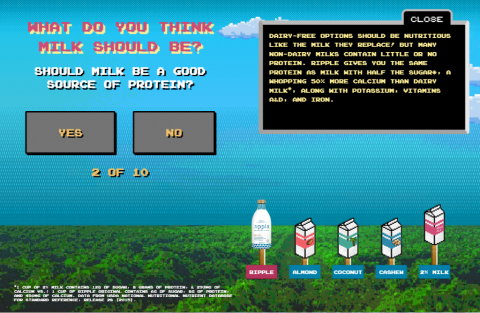
Not willing to sit idly as U.S. legislators seek to create and enforce tight, dairy-based definitions for the word “milk,” Ripple Foods launched a new digital media campaign this week that offers its take on the drink’s standard of identity.
Ripple, which makes a high-protein, plant-based milk, launched the campaign in response to the recent filing of the Dairy Pride Act in the U.S. Senate, which if passed would require the U.S. Food and Drug Administration (FDA) to enforce regulations defining the term “milk” as the “lacteal secretion” from farm animals.
To date, the FDA has been relaxed in its enforcement and many non-dairy brands that either use the word “milk” or variations such as “mylk” or “almondmilk” without incident.
Part of Ripple’s campaign recalls the dairy industry’s iconic “Got Milk?” campaign from the 1990s. One set of ads challenges the recent legal efforts by asking “Not Milk?” Another teasingly jabs the dairy industry, reading “You want to define milk as ‘a lacteal secretion’ from a cow really? Ewww!”
Links in the ads direct to www.whatismilk.org, which features an in-browser video game that quizzes users about whether they think milk should be nutritious, if it should be a good source of protein, and if it should be delicious. Each answer comes with educational information, but an “incorrect” answer will prompt a snappy response. For example, if you say milk should contain hormones, the game suggests you may be a Russian athlete. By the end, Ripple non-dairy milk is championed as the best tasting and most nutritious option on the market.
Ripple co-founder Adam Lowry told BevNET that the online ads will appear where consumers are more likely to be interested in dairy-alternative products, such as vegan and vegetarian blogs and health websites.
“We’re taking the opportunity to start a conversation about milk using satire,” Lowry said. “We feel like there is this sort of ridiculous and hilarious and sort of disgusting thing that is going on right now where the dairy industry is trying to take away the non-dairy industry’s ability to use the word milk in any context.”

It’s not just dairy in Ripple’s line of fire. The “What Is Milk?” game also calls almond milk “a sham” and accuses cashew, coconut, and other dairy-alternative milks of lacking significant nutritional value.
“The dairy industry’s got a point,” Lowry said. “The nut milks of the world have a tiny fraction of the nutritional content of milk, and milk is nutritious. And they’re harvesting some of that halo of the word ‘milk’ for their own benefit. I think dairy’s got an absolutely legitimate point to say they need to define the word, I just think there’s a much better way to do it than to define it as a ‘lacteal secretion.’”
Timothy Malefyt, a corporate anthropologist and marketing professor at Fordham University, said Ripple’s new campaign establishes them as the “classic challenger brand.”
“I think they’re seizing an opportunity,” Malefyt told BevNET. “This is not an entrenched category. This is not a locked down category that has existed for a long time, so there’s still new players and they’re seizing this advantage that there’s been this critique of these other products and other brands.”
Milk also lacks clear category leaders, Malefyt said, which gives Ripple space to build its own brand recognition.
According to Lowry, the name Ripple came from a plan to disrupt and resonate within the milk category. But although the company is not one to mince words, Lowry said he’s more than happy to work with the dairy industry to help create a new standard of identity that can work to everyone’s favor.
“We would love to collaborate with the dairy industry to come up with a suitable non-dairy standard for milk,” Lowry said. “We’ve tried to create a non-dairy milk that is worthy of that word ‘milk’ and if the dairy industry is willing to be inclusive we would love to work with them.”